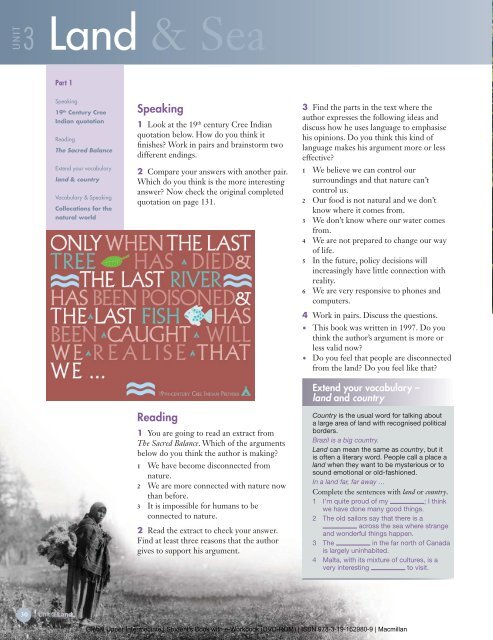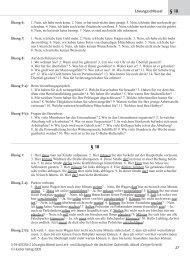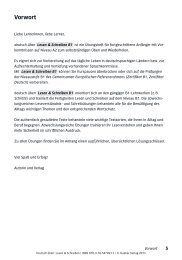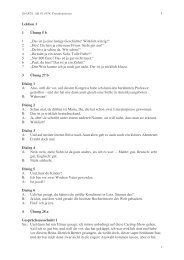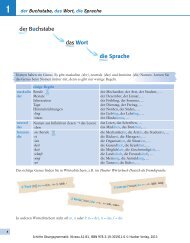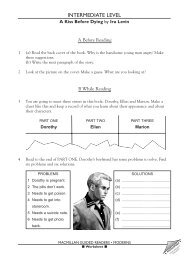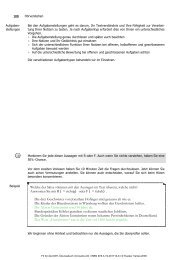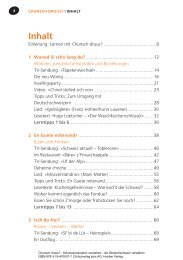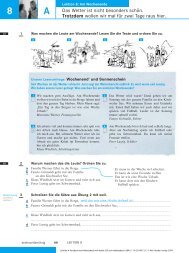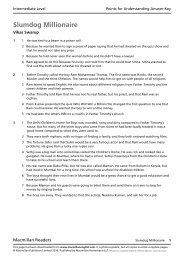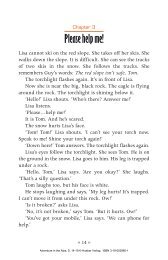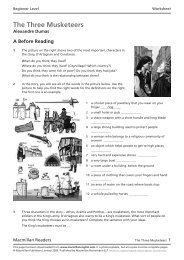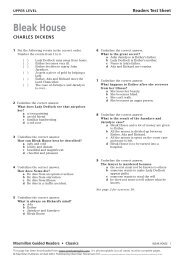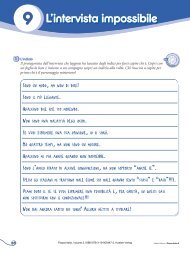ISBN 978-3-19-162980-9 | Macmillan
ISBN 978-3-19-162980-9 | Macmillan
ISBN 978-3-19-162980-9 | Macmillan
- No tags were found...
You also want an ePaper? Increase the reach of your titles
YUMPU automatically turns print PDFs into web optimized ePapers that Google loves.
UNIT3Land & SeaPart 3Vocabulary & SpeakingThe seaReadingAmazing Ocean FactsGrammarPresent perfectsimple & continuous,past simpleVocabulary and Speaking1 1.46 Close your books. Listen tothe sounds on the recording and write allthe words that they make you think of.Compare with a partner.2 Put the words below into differentgroups and give each group a heading. Usea dictionary to help you. Were any of thesewords on your list from exercise 1?current dive jellyfish sand seagullseashells seaweed shellfish shipsnorkel tanker tide waterskiingwave yacht3 Work in pairs. A: draw a picture of one ofthe words but don’t say what it is. B: say theword. Swap roles and repeat.Reading1 Read Amazing Ocean Facts on page 35.What do you think? Give each fact a rankfrom 1 to 3.1 = yes, this is an amazing fact2 = this is interesting, but not amazing3 = this is not really an amazing fact2 Look at the sentences below. Find themin the text. What words has the authorwritten / changed to make the sentencessound more ‘amazing’?Although deaths from shark attacks geta lot of attention, more people are killedeach year by elephants, bees, crocodiles,lightning or many other natural dangers.Up to 80% of all life on earth is foundunder the ocean surface.This wave occurred in the Gulf of Alaskain 1899.If all the world’s ice melted, scientistsestimate that the oceans would rise by66 metres, causing great damage tohuman life.Even in this day of modern technology,the seas are still used for a lot of humanactivity.Life on land has existed for 400 millionyears, which is just a short time,geologically speaking.3 Work in pairs. Choose three questionsfrom the list below and discuss.• How far do you live from the sea? Wouldyou like to live closer?• What role does the sea play in yourcountry’s economy?• Would you ever live on a boat if you hadthe chance? Why or why not?• Do you know any other interesting factsabout the sea?• Are there any sea expressions or proverbsin your language? What are they inEnglish?34Unit 3 SeaGlobal Upper Intermediate | Student's Book with e-Workbook (DVD-ROM) | <strong>ISBN</strong> <strong>978</strong>-3-<strong>19</strong>-<strong>162980</strong>-9 | <strong>Macmillan</strong>
UNIT3Land & SeaPart 4SpeakingMapsListeningThe Carta MarinaGrammarAdjective orderPronunciationSea Fever poemSpeaking1 Work in pairs. Choose three of thequestions below and ask and answer.• Do you like maps?• Are you good at reading maps?• Do you have a map in your home? Whatis it? Where is it?• Have you ever used a ‘satnav’ (a satellitenavigation system)? Do you prefer usingit to a map?• Could you draw a reasonably accuratemap of your country?2 Look at the Carta Marina map below.What does it show? How old do you thinkit is?Listening1 1.47 Turn to page 132 and listen to adescription of a section of the Carta Marina.Point to the items in the order that youhear them.2 Listen again and answer the questions.1 When and where was the Carta Marinadrawn? How big is it?2 What weren’t ancient mariners worriedabout, according to the speaker?3 What is interesting about the monster?4 What is a Leviathan?3 Here are descriptions of common seamonsters that appear in legends of manydifferent cultures. Do you recognise any ofthem? Do you know of any other ones?• An enormous squid or octopus that pullsboats down to the bottom of the sea.• A giant white shark that eats people andterrorises beaches.• A huge sea serpent that lives in verydeep lakes.• A creature with the head and body of awoman, and the tail of a fish.• A giant sea monster with several heads.36Unit 3 SeaGlobal Upper Intermediate | Student's Book with e-Workbook (DVD-ROM) | <strong>ISBN</strong> <strong>978</strong>-3-<strong>19</strong>-<strong>162980</strong>-9 | <strong>Macmillan</strong>
Grammar1 Look at the examples and complete therules with the words in the box.after before colour sizea fantastic ancient mapa strange giant serpenta wonderful old story• put adjectives of descriptionadjectives of opinionan old Swedish priesta huge green headlarge wooden blocks• with adjectives of description we usethis order: / age / /origin / material. All other adjectives ofdescription come immediatelythe noun2 Try to rearrange the words into thecorrect order. Check your answers with theaudioscript on page 152. Were you correct?1 detail small painstaking2 modern belief popular3 colourful monsters sea fantastic4 intricate tiny details5 right corner upper6 sailing English an ship7 head large green8 moon a small crescent3 Look at the map again. Think of as manyadjectives as you can to describe it, or partsof it. Take turns making sentences to buildup a description of the map.In the top left corner, you can see a hugebrown bird.GGrammar focus – explanation & morepractice of adjective order on page 138Pronunciation1 Find six pairs of words with the samesound in the box. Then match each pair tothe sounds below.break clear cloud down dreamsky steer whale wheel white 2 1.48 Listen and check your answers.What are the common spellings for thesesounds? Can you think of other words orspellings for these sounds?3 1.49 Read and listen to a famouspoem about the sea. Then work in pairs.Read each line one at a time. Pay attentionto the sounds in exercise 1.Sea FeverJohn Masefield (1878–<strong>19</strong>67)was an English novelist andpoet famous for the novels andpoems he wrote for children.He was poet laureate for GreatBritain for over thirty years.I must go down to the seas again, to the lonely sea and the sky,And all I ask is a tall ship and a star to steer her by,And the wheel’s kick and the wind’s song and the white sail’s shaking,And a grey mist on the sea’s face, and a grey dawn breaking.I must go down to the seas again, for the call of the running tideIs a wild call and a clear call that may not be denied;And all I ask is a windy day with the white clouds flying,And the flung spray and the blown spume, and the sea-gulls crying.I must go down to the seas again, to the vagrant gypsy life,To the gull’s way and the whale’s way, where the wind’s like a whetted knife;And all I ask is a merry yarn from a laughing fellow-rover,And quiet sleep and a sweet dream when the long trick’s over.Sea Fevercomes from acollection of poemscalled Salt WaterBallads, publishedin <strong>19</strong>02.Sea Unit 3 37Global Upper Intermediate | Student's Book with e-Workbook (DVD-ROM) | <strong>ISBN</strong> <strong>978</strong>-3-<strong>19</strong>-<strong>162980</strong>-9 | <strong>Macmillan</strong>
UNIT3Function globally interpreting dataSea Level Change (cm)35302520151050-5RECENT SEA LEVEL RISE23 ANNUAL TIDE GAUGE RECORDSThree Year AverageSatellite AltimetrySea Level Change (m)0-20-40-60-80-100-120POST-GLACIAL SEA LEVEL RISE✢✢✢✢ ✢✢ ✢✢✢ ✢ ✢ ✢ ✢✢ ✢ ✢✢✢✢ ✢✢✢ ✢✢ ✢✢✢ ✢✢✢ Santa Catarina ✢✢Rio de Janeiro ✢✢ ✢ Senegal ✢✢ ✢Malacca Straits ✢Meltwater Pulse 1A ✢✢ Australia ✢✢✢ Jamaica ✢✢Tahiti ✢✢Huon Peninsula ✢✢Barbados ✢Last GlacialMaximumSunda/Vietnam Shelf ✢✢✢✢ ✢✢✢✢✢ ✢✢✢✢✢ ✢✢ ✢ ✢✢✢✢ ✢ ✢ ✢-1401880 <strong>19</strong>00 <strong>19</strong>20 <strong>19</strong>40 <strong>19</strong>60 <strong>19</strong>80 2000Warm upWork in pairs. Look at the two graphs and take turnscomparing and contrasting the data shown.Listening1 1.50 Listen to someone describing the two graphsabove. What is his conclusion?2 Listen again. What do the following numbers refer to?120 1.8 3 6,000Language focus: interpreting data1 Put the elements in order to make sentences.1 for thousands of years / sea levels / in effect / have beenrising2 a case of / this / is / global warming3 this points to / human activity / a recent increase in4 the seas / the data / are rising / suggests / more rapidly5 that / this / could indicate / a normal phenomenon / it is6 to worry about / there is / could mean / nothing / this2 1.51 Listen to check your answers. Then underlinethe phrases which are used to interpret data.24 22 20 18 16 14 12 10 8 6 4 2 0Speaking1 Look at the graph below and make some notesabout how you could describe it – include your owninterpretation, using the phrases you have learned.2 Work in pairs. Describe the graph and yourinterpretation.Average area (thousand hectares) cleared per year3500300025002000150010005000BrazilIndonesiaTROPICAL DEFORESTATION RATES,2000-2005Share of tropical deforestation,2000-2005Venezuela3%Zimbabwe3%DR Congo3%Nigeria4%Other tropicalcountries31%Tanzania4%Zambia4%Brazil27%Indonesia17%Myanmar4%MyanmarZambiaTanzaniaNigeriaDR CongoZimbabweVenezuelaBoilviaMexicoCameroonCambodiaEcuadorParaguayPhilippinesHondurasEthiopiaMalaysiaPapua New GuineaAngolaGhanaMaliPeruUganda38Unit 3 Function globallyGlobal Upper Intermediate | Student's Book with e-Workbook (DVD-ROM) | <strong>ISBN</strong> <strong>978</strong>-3-<strong>19</strong>-<strong>162980</strong>-9 | <strong>Macmillan</strong>
Global EnglishTrade languageby David CrystalHow long does it take for a new global variety of English to evolve? Not very long at all.In 1607, after a long and eventful sea voyage from England, Captain John Smith arrived in America, and soonafter became president of the council of Jamestown in Virginia. A highly controversial figure, he exploredthe new territory at length, and wrote about his encounters with the native American tribes. He became wellknownbecause of the story that he was saved from execution by Pocohontas, the daughter of an Indianchief – though whether this actually happened in the way he described has been greatly debated.Smith sent his account of the new colony back to Britain, where it was published. English people wouldnever have seen such place names as Rappahannock and Nandtanghtacund before. The fauna and flora ofthe new country introduced them to racoons and skunks. Other accounts talked ofmoccasins, wigwams, and squaws. These words were being read in Britain within afew years of the colonists’ arrival – the first signs of a future American English.We see the same kind of process happening all over the world, as English hastravelled to new shores. Within a very short time of settlers arriving, we find themusing a local vocabulary and writing home about it. After only a few years, thesenew words can number several hundred. The manner of speech alters too, so that adistinctive accent is one of the earliest signs of a new variety of English.Probably the most dramatic linguistic result of world exploration is the invention ofa pidgin or trade language. What happens when sailors and the local people meetand have no language in common? They do their best to communicate. Everyoneinstinctively talks in a simpler way, making sentences shorter, repeating words, andavoiding difficult sounds and grammar. After a while, a pidgin language can becomequite sophisticated, and be used as an everyday means of communication. It can evenend up as a national language, as has happened to Tok Pisin in Papua New Guinea –one of most impressive linguistic consequences of sea travel ever.Glossarycontroversial (adjective) – likelyto lead to public disagreementWarm up1 Read the following phrases out loud. What do you thinkthey mean?Gutbai. Plis, Tenkyu. Wan, tu, tri ... Mi sori.2 These are all examples of Tok Pisin, a national languagein Papua New Guinea. Tok Pisin started out as a tradelanguage, or pidgin. How do you think it was invented?Reading1 Read Trade language and check your answer to Warm upexercise 2.2 Read the text again and choose the correct answer.1 The English Captain John Smith was saved fromexecution by Pocohontas.a This is probably true.b This is probably untrue.c People are not sure if this is true or not.2 The beginnings of American English came from ...a the names of local animals and plants.b Captain John Smith’s Virginia accent.c the books and history of American tribes.3 Pidgins and trade languages ...a start with a more simple structure.b can be quite sophisticated.c both a and b.3 Complete the sentences with the correct form of theword in bold. All the words are in the text.l We had an journey to the airport and almostmissed our plane.EVENT2 This island was occupied by English for twohundred years.COLONY3 Oh, you can’t miss her. She wears very clothes.DISTINCT4 It was rather a boring film, but it had a veryending.DRAMA5 When I saw the ball coming towards me Icovered my head.INSTINCTSpeakingWork in pairs. Read the situation below and discussthe question.Some people argue that what the worldneeds is a simplified form of English.Do you think a trade language for English is a good idea? Listthe possible advantages and disadvantages of such a system.Global Upper Intermediate | Student's Book with e-Workbook (DVD-ROM) | <strong>ISBN</strong> <strong>978</strong>-3-<strong>19</strong>-<strong>162980</strong>-9 | <strong>Macmillan</strong>Global voices Unit 3 39
UNIT3Writing an email to a friendReading1 Read Daniel’s email to Emily and answer the questions.1 Where has he been recently?2 What recommendations does he make?Hi Emily,How are you? It’s ages since we had thatbrilliant meal at your house (I’m attachingsome photos!). What have you been doing? Howwas your holiday? Did you get a chance to go to theseaside in the end? Or did you have too much work?Please forgive me for not emailing you for so long. A lot ofthings have happened actually, which have stopped me fromcontacting you …I’m now back at work and I’ve been really busy, catching up withemails and other things.Remember you told me about the National Centre for Traditional Artsin Yi-Lan, that you’ve been dreaming of visiting? Well, I went therewith some friends last weekend! We had an amazing time!! It’s a hugeplace, and you really need more than one day to see it properly. Thereare loads of old buildings, restaurants and shops where you can buytraditional handicrafts like ceramics, toys and clothes and calligraphy.We also watched some fascinating performances of traditional dance, aswell as demonstrations of traditional crafts. And we ate loads of deliciousTaiwanese snacks!For me the most interesting part was a beautiful old town inside the centrewhich is basically a reconstruction of a traditional Taiwanese town. Thewhole town is built and decorated in an authentic style, so that when yougo inside you feel as if you’re walking into Taiwan of the <strong>19</strong> th century. It hasa really peaceful, nostalgic atmosphere. I took loads of pictures – I can’twait to show you them! Anyway, you really have to go and check it out foryourself – as you said, seeing is believing, isn’t it?!All for now – keep in touch, and email me soon to let me know howyou’re getting on.Best wishesDaniel2 What do you learn about the following?1 The last time Daniel saw Emily.2 Emily’s summer plans.3 Daniel’s recent activities.4 Things to buy at the Centre.5 What Daniel saw and did at the Centre.6 The most interesting part of the Centre.7 The appearance of the town.8 The atmosphere of the town.Writing skills: an email to afriendA General advice1 Read the advice on writing an email ora letter to a friend.1 Use informal salutationse.g. Hello Gina, Hi Jon.2 Use informal punctuatione.g. ! ( ) – …3 Use contractions e.g. I’ve, it’s, hasn’t.4 Ask questions about your friend.5 Mention things that you both knowabout.6 Use informal endingse.g. Cheers, Take care, All for now, Love,All the best, Best wishes.2 Underline examples of the advice inexercise 1 in Daniel’s email.40Unit 3 WritingGlobal Upper Intermediate | Student's Book with e-Workbook (DVD-ROM) | <strong>ISBN</strong> <strong>978</strong>-3-<strong>19</strong>-<strong>162980</strong>-9 | <strong>Macmillan</strong>
Study skillsB Informal languageUse informal language in an email or letter to a friend.Complete the sentences below from the email.Informal words and expressions:1 It’s ages since we had that meal at your house.2 We had an time!!3 We took pictures.4 You really have to go and it foryourself.Informal discourse markers:5 A lot of things have happened .6 , I went there with some friends last weekend!7 , you really have to go.Starting sentences with a conjunction (and, but, so, or):8 did you have too much work?9 we ate loads of delicious Taiwanese snacks!Preparing to writeThink of an interesting place you have visited recently. Askand answer questions with a partner.• Where and when did you go?• What was it like?• What did you see and do?• What was the most interesting part?• Is it worth visiting? Why / Why not?Email expressions• Thanks for the mail / email• Hope you’re OK / all is well with you• Please forgive me / Sorry for not emailing / getting intouch for so long• I’m glad / sorry to hear that …• Keep in touch / Email me soon and let me know howyou’re getting on• Hope to hear from you soonWritingWrite an email to a friend describing your visit. Useinformal language and follow the advice in Writing skills.Communication strategies1 Do the quiz and then compare your answers in pairs.What do you do in these situations?1 You can’t think of a word or expression when you arespeaking.a Do you pause and feel embarrassed?b Do you avoid the topic?c Do you find another way to express your ideas?2 You don’t understand something that another personsays.a Do you smile and pretend to understand?b Do you finish the conversation?c Do you ask for clarification?3 You think that someone doesn’t understand you.a Do you just carry on speaking?b Do you give up and change the topic?c Do you ask what isn’t clear or rephrase your ideas?If you answered c to all the questions, you have goodcommunication strategies. If you answered a or b,consider using some of the strategies below.2 Match the strategies (1–9) to the examples (a–i).1 Ask for clarification.2 Check that other people understand.3 Give yourself time to think.4 Ask for help.5 Use a general word.6 Explain or define the word.7 Use translation.8 Invent a word in English.9 Use mime or gesture or facial expression.a Are you with me?b If you ride a motorcycle, you have to wear a hat.c It went like this (hands demonstrate explode).d We eat, how do you call it, those plants that growunder the sea.e Sorry, I’m not clear what you mean. Could you repeatthat please?f For my birthday she made me a gateau.g Just a minute, let me think how to say this.h What’s the word in English?i He is very ‘compromised’ with his political party –can you say that in English?**Learn some of the phrases from exercise 2.Plan to try out a new strategy every week.Global Upper Intermediate | Student's Book with e-Workbook (DVD-ROM) | <strong>ISBN</strong> <strong>978</strong>-3-<strong>19</strong>-<strong>162980</strong>-9 | <strong>Macmillan</strong>Writing & Study skills Unit 3 41


